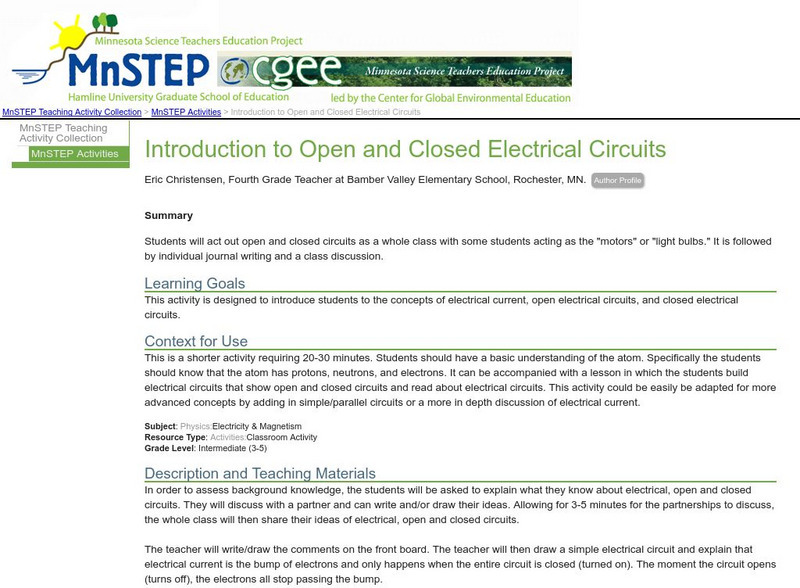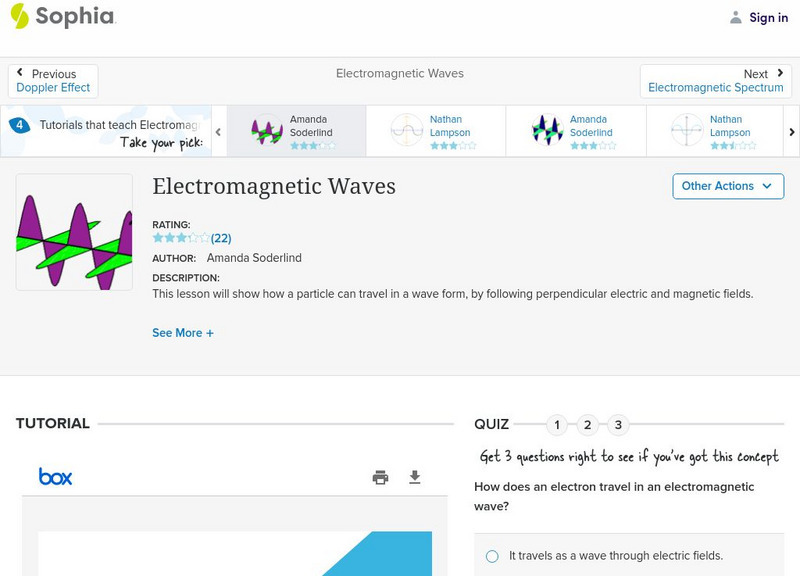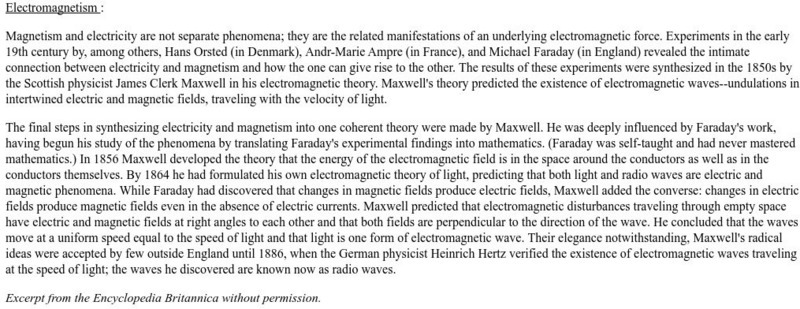Hi, what do you want to do?
NASA
Nasa: Oersted and Ampere Link Electricity
NASA provides a nice blending of the achievements of three scientists, Oersted, Ampere, and Maxwell. This done by NASA-sponsored International Solar-Terrestrial Physics group. Lots of pictures, diagrams, and scientific explanation. Good...
Science Education Resource Center at Carleton College
Serc: Introduction to Open and Closed Electrical Circuits
This activity introduces students to the concepts of electrical current and open and closed circuits. Students will act out open and closed circuits as a whole class with some students acting as the "motors" or "light bulbs."
Math Science Nucleus
I. Science Ma Te: Integrating Science, Math and Technology
This site offers a wealth of online textbook-related materials that encourage the discovery of science in the world around us. Enter the site to access material on specific topics. Each section contains reading material (complete with...
Science Struck
Science Struck: Electromagnetic Energy and Why It Is Important
Explains what electromagnetic energy is, the history of its discovery, some terms used when talking about it, and gives some facts about it.
Canada Science and Technology Museum
Canada Science and Technology Museum: Sound Recording
The Canada Science and Technology Museum tells the history of recorded sound. Learn about the hundreds of sound recording devices in the museum's archives. These are grouped into four main categories: Acoustical-Mechanical Systems,...
TeachEngineering
Teach Engineering: Yogurt Cup Speakers
This lesson introduces students to the role of electricity and magnetism as they build a speaker. In addition, students explore properties of magnets, create an electromagnet, and determine the direction of a magnetic filed. They conduct...
Sophia Learning
Sophia: Electromagnetic Waves: Lesson 1
This lesson will show how a particle can travel in a wave form, by following perpendicular electric and magnetic fields. It is 1 of 4 in the series titled "Electromagnetic Waves."
Science Education Resource Center at Carleton College
Serc: Electromagnetic Induction Demonstration
Students learn the relationship between the electric and magnetic fields. Specifically, they verify that a magnetic field is created in a current carrying coil of wire and a changing magnetic field can induce a current in another coil of...
Science Bob Pflugfelder
Science Bob: Build an Electromagnet!
This site presents a procedure for creating your own electromagnet using an iron nail, some wire, and a battery. The site illustrates a connection between electricity and magnetism.
University of Oregon
University of Oregon: Electromagnetism
A solid summary from the University of Oregon of the work of James Maxwell Clerk, Michael Faraday, and others in the field of electric and magnetic phenomena. This is a fine essay.
Annenberg Foundation
Annenberg Learner: Physics: Early Unification for Electromagnetism
Discusses the connection between electricity and magnetism and the early work of Michael Faraday and James Clerk Maxwell. Electromagnetic interactions were first described by Maxwell. Continues on with a discussion of quantum physics and...
National High Magnetic Field Laboratory
Magnet Academy: Luigi Galvani
Luigi Galvani was a pioneer in the field of electrophysiology, the branch of science concerned with electrical phenomena in the body. His experiments with dissected frogs and electrical charges led him to suggest the existence of a...
National High Magnetic Field Laboratory
Magnet Academy: Rheostat
After discovering the nature of electrical resistance, scientists devised instruments like this one to measure and control it. (Java tutorial)
National High Magnetic Field Laboratory
Magnet Academy: Leyden Jars 1745
Because they could store significant amounts of charge, Leyden jars allowed scientists to experiment with electricity in a way never before possible.
National High Magnetic Field Laboratory
Magnet Academy: Joseph John Thomson
Joseph John Thomson, better known as J. J. Thomson, was a British physicist who first theorized and offered experimental evidence that the atom was a divisible entity rather than the basic unit of matter, as was widely believed at the...
National High Magnetic Field Laboratory
Magnet Academy: Michael Faraday
A self-educated man with a brilliant mind, Michael Faraday was born in a hardscrabble neighborhood in London. Through the combination of insatiable curiosity and a powerful will to succeed, he transcended his austere beginnings to...
National High Magnetic Field Laboratory
Magnet Academy: Galvanometer
This tutorial illustrates how a galvanometer, an instrument that detects and measures small amounts of current in an electrical circuit, works. (Java tutorial)
National High Magnetic Field Laboratory
Magnet Academy: Tesla Coil 1891
By the late 1800s, electricity had long been discovered and was no longer considered a novelty. The science of how to store, enhance, or transmit electrical current was just beginning to evolve, and eccentric scientist Nikola Tesla...
National High Magnetic Field Laboratory
Magnet Academy: William Crookes
English scientist William Crookes was very innovative in his investigations with vacuum tubes and designed a variety of different types to be used in his experimental work. Crookes tubes are glass vacuum chambers that contain a positive...
National High Magnetic Field Laboratory
Magnet Academy: Leyden Jar
These devices, though quite humble, represented a tremendous breakthrough in the history of electricity; they were the first capacitors, and as such were able to store electric charge. (Java tutorial)
National High Magnetic Field Laboratory
Magnet Academy: Peter Debye
Peter Debye carried out pioneering studies of molecular dipole moments, formulated theories of magnetic cooling and of electrolytic dissociation, and developed an X-ray diffraction technique for use with powdered, rather than...
National High Magnetic Field Laboratory
Magnet Academy: Voltaic Pile 1800
For thousands of years, electricity was an ephemeral phenomenon- there one second and gone the next. The voltaic pile changed that forever.
National High Magnetic Field Laboratory
Magnet Academy: Humphry Davy
Humphry Davy was a pioneer in the field of electrochemistry who used electrolysis to isolate many elements from the compounds in which they occur naturally. Electrolysis is the process by which an electrolyte is altered or decomposed via...
Learn Engineering
Learn Engineering: Understanding Rotating Magnetic Field & Synchronous Speed
Get information about rotating magnetic fields and how electric machines use them for their operation. Discusses synchronous speed and number of poles on an electrical machine. The accompanying article discusses the topics found in the...
























